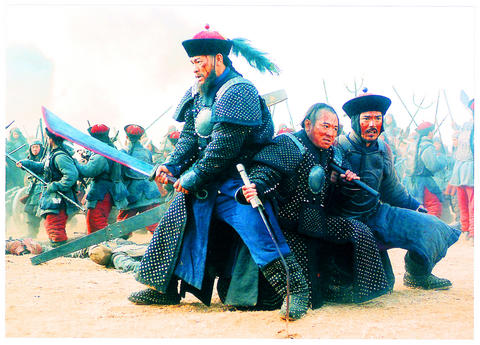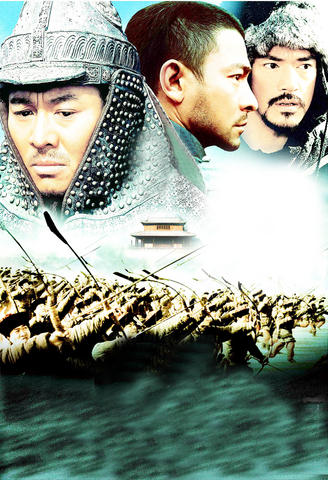Peter Chan's (陳可辛) big-budget costume drama The Warlords is something of a revelation after the succession of recent Chinese history flicks that have tried to rival Hollywood and been found wanting.
Trashy confections such as Zhang Yimou's (張藝謀) Heroes (英雄), Chen Kaige's (陳凱歌) The Promise (無極) and Stanley Tong's (唐季禮) The Myth (神話) come to mind with a shudder of shame and despair over how so much talent could be so misdirected. The Warlords is anything but perfect, but at least it remains committed to its story about brotherhood, the horrors of war and the price paid for ambition, managing to overcome its numerous lapses and hold the audience by the balls through its two-hour length. It's not always a comfortable feeling.
Loosely based on historical characters, The Warlords tells the story of General Pang Qingyun, who having lost one army after being abandoned by a rival colleague, throws in his lot with a group of bandits and uses their savagery and desperation to claw his way back into military favor. Bloody battles are fought, victories celebrated and tens of thousands of people killed. In the process, Pang abandons the few principles he ever had, betrays those closest to him to establish his position at court and is eventually assassinated. The action takes place against the background of the Taiping Rebellion (太平天國), a period of civil war that almost toppled the tottering Qing Dynasty, and during which a weak and corrupt government spent almost as much energy in internal conflict as it did trying to suppress the rebel movement.

PHOTO: COURTESY OF ARM ENTERTAINMENT
In The Warlords, Chan has decided to paint on a big canvas, with much of the action taking place in China's stark and forbidding hinterlands. Starvation, willful destruction, rape and rapine are all part of the daily currency of life. The hideousness of war and the carnage wrecked on ordinary people for the ambition of a few are both forcefully underlined. The use of screen text to note the massive scale of casualties - 20 million are estimated to have perished through famine and massacre - and the voice-over by Takeshi Kaneshiro's (金城武) character, are good old-fashioned and very unsubtle ways of making Chan's themes clear. The violence of the battle sequences is sometimes breathtaking, and Chan manages to convey the ecstatic blood lust of his main characters - the smell of success is the smell of the enemies' blood and hacked off limbs - without glorifying the conflict. Graphic scenes of mutilation and the mass execution of unarmed prisoners are not for weak stomachs, though Chan relies more on his audience's imagination than buckets of gore. Indeed, the washed out, almost monochrome palette, reminiscent of the battle sequences in Flags of Our Fathers and Letters From Iwo Jima, gives the film an impressively harsh and gritty look, and sets up a stark contrast to the saturated colors used after the three warlords of the film's title fight their way to success.
Another theme is that of brotherhood and the harsh toll extracted on friendship by ambition. Pang and his two bandit colleagues gamble everything - their own lives and the lives of the followers. But when the hard moral decisions are faced, brotherhood begins to strained. One of the most interesting revelations from The Warlords is that Jet Li (李連杰) can actually act, and he stands up well against Andy Lau (劉德華) and Kaneshiro, emerging as the most convincing of the three. Admittedly, his role is not one that demands great subtlety, but the driving ambition and the duplicity to which it gives rise are effectively conveyed. Having done an adequate job with Fearless (霍元甲, 2006), another Chinese history flick, it is encouraging to see Li cementing his escape from what seemed an endless cycle of Asian exotics that started out with his role in Lethal Weapon 4 (1998), and followed by Romeo Must Die (2000), Kiss of the Dragon (2001), Cradle 2 Grave (2003) and most recently Rogue Assassin (2007).
With Li catering to the martial arts crowd, Lau and Kaneshiro provide the eye candy, but neither really shines. Lau, as the simple illiterate peasant who is also the voice of conscience, is rather too prone to tears, and Kaneshiro is too busy managing his boy-band good looks to really pull off his role as Jiang, who commits himself totally to the idea of "one for all and all for one," and is torn apart when the ideal comes unstuck. The only woman in the movie, Xu Jinglei (徐靜蕾) as the enigmatic Lian, gets the short end of the stick in a belated attempt to cement the loyalty of the brothers - brotherhood movie credentials don't come any clearer than that. The love triangle between Pang and Cao never really gets off the ground, but Xu manages to give mud and matted sheepskin cloaks a quite improbable sexiness - no mean feat - but it is the politics of success that really drives the movie.

PHOTO: COURTESY OF ARM ENTERTAINMENT
While the cinematography is generally excellent and the fight scenes - including a magnificently choreographed charge, first of infantry and then of cavalry into a sea of enemy troops - is gut-wrenching to watch, the script often lumbers along. There is also a rather eerie effect when rain - and there is a lot of rain - falls around the protagonists rather then on them when they are doing their close-up emotional scenes. It's as if there is an invisible shield around their faces that ensures the tears are not lost in the rain, and they get to enunciate their somewhat platitudinous sentiments without spluttering.
The Warlords takes itself seriously as a film about ideas and is as good a reprise to the conventional Hong Kong cinema staple of brotherhood as one could hope for. It's addition of a thought-provoking take on the horrors of war and the lure of gambling with the lives of others makes it outstanding, for all its faults, and with luck will steer other Chinese director away from endless efforts to remake Ang Lee's (李安) Crouching Tiger, Hidden Dragon (臥虎藏龍).

Behind a car repair business on a nondescript Thai street are the cherished pets of a rising TikTok animal influencer: two lions and a 200-kilogram lion-tiger hybrid called “Big George.” Lion ownership is legal in Thailand, and Tharnuwarht Plengkemratch is an enthusiastic advocate, posting updates on his feline companions to nearly three million followers. “They’re playful and affectionate, just like dogs or cats,” he said from inside their cage complex at his home in the northern city of Chiang Mai. Thailand’s captive lion population has exploded in recent years, with nearly 500 registered in zoos, breeding farms, petting cafes and homes. Experts warn the

No one saw it coming. Everyone — including the Chinese Nationalist Party (KMT) — expected at least some of the recall campaigns against 24 of its lawmakers and Hsinchu Mayor Ann Kao (高虹安) to succeed. Underground gamblers reportedly expected between five and eight lawmakers to lose their jobs. All of this analysis made sense, but contained a fatal flaw. The record of the recall campaigns, the collapse of the KMT-led recalls, and polling data all pointed to enthusiastic high turnout in support of the recall campaigns, and that those against the recalls were unenthusiastic and far less likely to vote. That

The unexpected collapse of the recall campaigns is being viewed through many lenses, most of them skewed and self-absorbed. The international media unsurprisingly focuses on what they perceive as the message that Taiwanese voters were sending in the failure of the mass recall, especially to China, the US and to friendly Western nations. This made some sense prior to early last month. One of the main arguments used by recall campaigners for recalling Chinese Nationalist Party (KMT) lawmakers was that they were too pro-China, and by extension not to be trusted with defending the nation. Also by extension, that argument could be

Aug. 4 to Aug. 10 When Coca-Cola finally pushed its way into Taiwan’s market in 1968, it allegedly vowed to wipe out its major domestic rival Hey Song within five years. But Hey Song, which began as a manual operation in a family cow shed in 1925, had proven its resilience, surviving numerous setbacks — including the loss of autonomy and nearly all its assets due to the Japanese colonial government’s wartime economic policy. By the 1960s, Hey Song had risen to the top of Taiwan’s beverage industry. This success was driven not only by president Chang Wen-chi’s